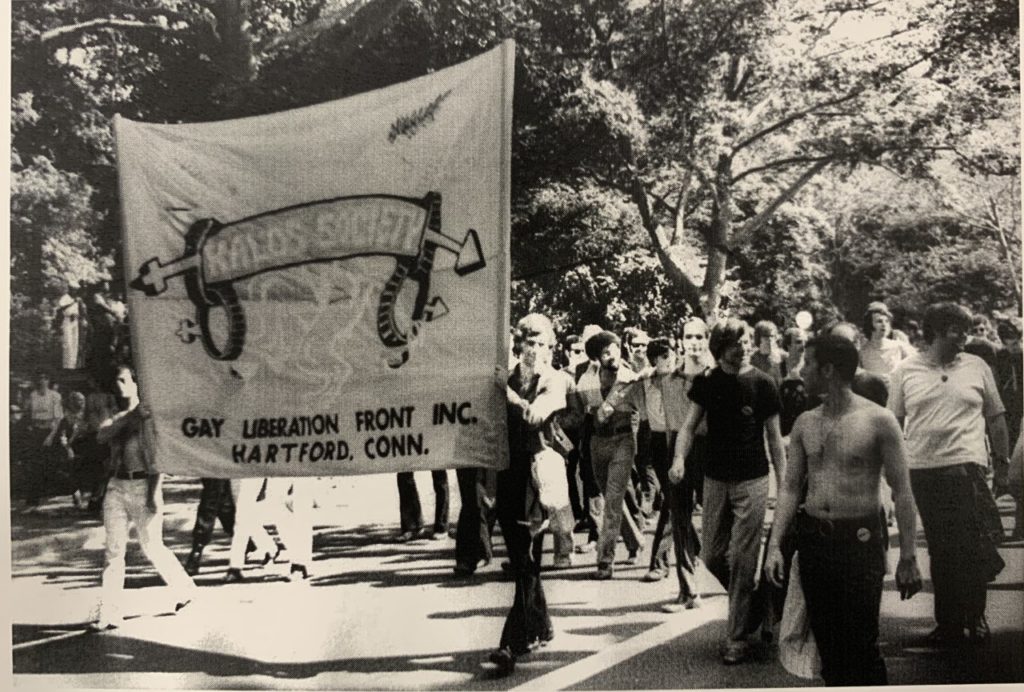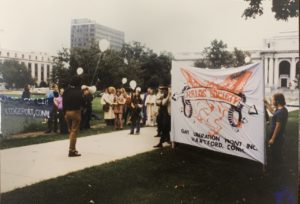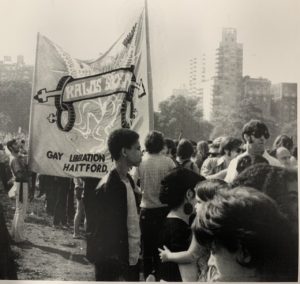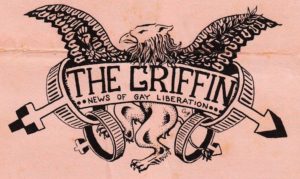By Eve Galanis
Before the Stonewall Riots defined the modern LGBTQ+ movement nationally, the Kalos Society emerged in the late 1960s as the first gay activist organization in Connecticut. Inspired by the work of Canon Clinton Jones, the pioneering Kalos Society concentrated on queer visibility, acceptance, and activism.
Foundations of Gay Liberation
The Kalos Society was an offshoot of the group, Project H, which Canon Clinton Jones and others started in 1963 to provide educational and counseling services for gay people in the Christian community. In 1968, the Kalos Society (derived from the Greek word, καλώς (kalós) meaning “good or noble man”) originally started as a support group for the counselees of Project H. Later, it evolved into an advocacy, psychological support, and social organization. While the Kalos Society preceded the Stonewall riots, the events in New York City inspired the organization to mobilize and become more radical.
Keith Brown, Harry Williams, and Ken Laughlin were the three original founders of the Kalos Society. According to them, the goal of the organization was to “learn to like ourselves and then we could become political.” The organization served several purposes: a social organization and meeting place for people outside of the bar scene, a group therapy space for gay men, and a political activist organization. Later, the inclusion of members Ken Bland and Ron Melvin politically galvanized the group. The goal of their political activism was to obtain equal rights and fair treatment through education of the public. According to Keith Brown, both Bland and Melvin “worked very hard to make sure our voices were also being heard in the Hartford political arena.” Unfortunately, both men died of AIDS and did not get to witness the results of their tireless efforts for gay rights.
Protests, Festivals, and Advocacy
The Kalos Society was involved in organizing several social events and political protests throughout the state in the early 1970s. Starting in 1970, they also published a newsletter, The Griffin, promoting events and legislative news. In 1971, they attempted to host a picnic at Goodwin Park in the South end of Hartford. Locals protested the picnic—four hundred residents signed a petition to prohibit the group from gathering at the park. The petition stated that “we feel that this group prohibits the natural law set down by God. We therefore request that the City of Hartford be enjoined from issuing a permit for the park for this group.” In the wake of this controversy, local authorities issued an ordinance that required a permit for public speeches in Hartford parks.
Despite the opposition, the Kalos Society helped organize the Connecticut Liberation Festival in 1971—the state’s first Pride festival. While the members felt it did not live up to their expectations—citing disorganization and a low turnout—the gay community remembered it as the first major effort in a communal gay festival. In reference to the festival, A Griffin article reflected that “Conn. gays are finally realizing ourselves, our gay sisters and brothers and our glorious destiny as loving and beautiful GAY people.” Activities included Friday and Saturday night dances, a Saturday afternoon picnic at Elizabeth Park, and a Sunday church service and march to the state capitol.
Over the years, the Kalos Society organized several protests in the state to stand against unfair treatment. These protests included such issues as the women’s dress code at The Park West bar in Hartford and the lack of protection of LGBTQ+ individuals by Bridgeport police. Sometimes these protests led to the arrests of members, who reported verbal and physical abuse by police.
In 1971, the American School for the Deaf in West Hartford suspended Ken Bland without pay for appearing on local television representing the Kalos Society. The school administration defended their actions by stating that they were responding to concerns from parents. They offered Bland an alternative job as a custodian, but he turned down the demotion. The American Civil Liberties Union (ACLU) got involved and the events inspired the Kalos Society to advocate for the first gay rights legislation in the state. The bill did not make it to a vote and did not pass until 1991. However, the efforts of the Kalos Society were the foundational seeds of LGBTQ+ justice in the state of Connecticut.
The Legacy of Kalos
Over the next several decades, other organizations—such as the Gay Liberation Front—emerged to supplement the activities of the Kalos Society and further organize the gay community. In 1973, however, the Kalos Society absorbed itself and its funding into the newly established Metropolitan Community Church in Hartford. The Griffin newsletter later evolved into Metroline—a Connecticut LGBTQ+ magazine that ran from 1982 until 2007. In 1980, Kalos founding member Keith Brown started Gay Spirit Radio on WWUH, one of the nation’s oldest gay radio shows. Known as “the original social media,” Gay Spirit Radio has been on the air for over 40 years, promoting queer activists, policy, and entertainment.
While the Kalos Society was a short-lived organization, its leaders, causes, and activities are visible in its successive organizations. The efforts of its members to establish human rights advocacy, visibility, and social justice was paramount to defining Connecticut’s LGBTQ+ communities and activism. The legacy of Kalos—yearly Pride Festivals, Gay Spirit Radio, and a multi-generational coalition of activists—continues to have an impact on the state.
Eve Galanis is a historian, teacher, and artist based in Connecticut. Her research is primarily centered on historical justice and intersectional critical theory. She currently teaches history and philosophy at Classical Magnet School in Hartford.












